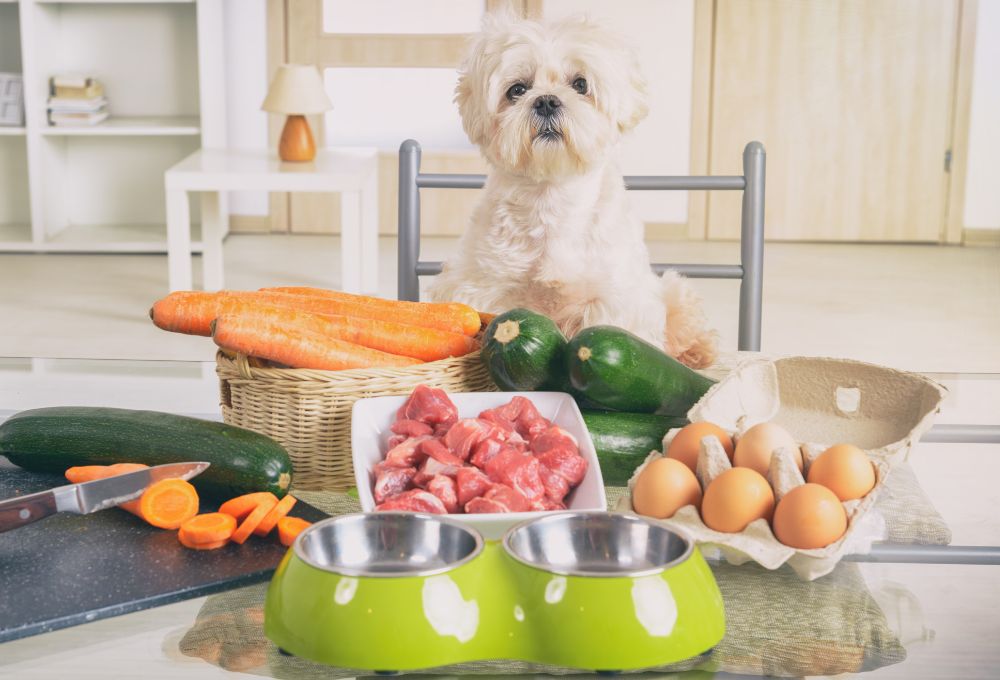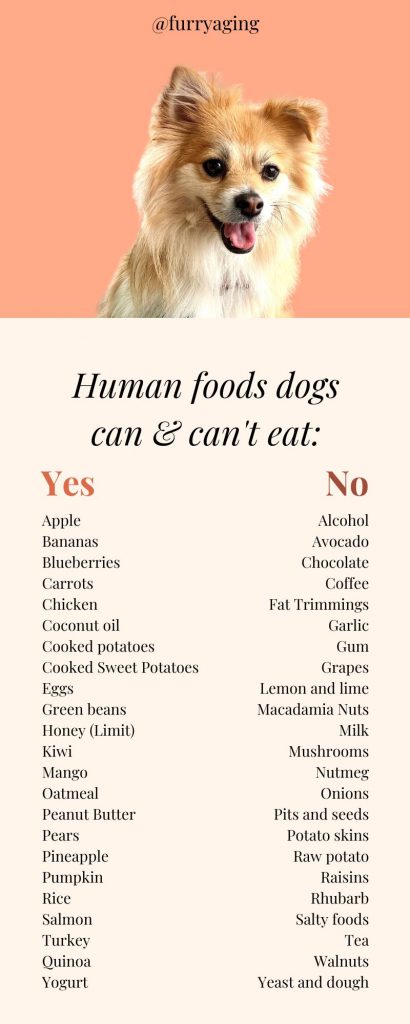There are several benefits of feeding your senior dog with homemade food. You can control the quality of the ingredients, ensuring they receive the necessary nutrients. You can accommodate your dog’s preferences to make sure they enjoy their meals. Moreover, you can also save some money in the long run if you buy the ingredients in bulk.

Home cooking may seem intimidating at first but with a little preparation, you can make it a rewarding experience. In this article, we have put together 5 delicious and easy-to-make recipes to encourage you to start cooking at home for your old friend.
- 1. Turkey and Sweet Potato Delight
- 2. Salmon and Quinoa Mix
- 3. Chicken and Brown Rice Surprise
- 4. Beef Stew for Senior Dogs
- 5. Veggie Lentil Mix
- Common Health Problems in Senior Dogs
- Key Nutrients for Health and Vitality
- Supplements for Senior Dogs
- Feeding Guidelines
- What human foods can I feed my dog?
- Final Thoughts
1. Turkey and Sweet Potato Delight
Ingredients:
- 1 cup cooked and shredded turkey
- 1 cup mashed sweet potatoes
- 1/2 cup cooked peas
- 1 tablespoon fish oil
- 1 teaspoon dried parsley (for fresh breath)
Instructions:
- In a mixing bowl, combine the shredded turkey, mashed sweet potatoes, and cooked peas.
- Add fish oil for extra omega-3 fatty acids.
- Sprinkle dried parsley for fresh breath.
- Mix well and serve!
2. Salmon and Quinoa Mix
Ingredients:
- 1 cup cooked salmon (deboned and flaked)
- 1 cup cooked quinoa
- 1/4 cup steamed broccoli
- 1/4 cup grated carrots
- 1 teaspoon coconut oil
Instructions:
- Mix the cooked salmon, quinoa, steamed broccoli, and grated carrots in a bowl.
- Drizzle with coconut oil for added flavor and health benefits.
- Stir thoroughly and serve once cooled.
3. Chicken and Brown Rice Surprise
Ingredients:
- 1 cup cooked and shredded chicken
- 1 cup cooked brown rice
- 1/2 cup cooked green beans
- 1/4 cup finely chopped apples
- 1/4 teaspoon turmeric powder (anti-inflammatory)
Instructions:
- Combine shredded chicken, cooked brown rice, cooked green beans, and chopped apples.
- Add a dash of turmeric powder for its anti-inflammatory properties.
- Mix well and serve!
4. Beef Stew for Senior Dogs
Ingredients:
- 1 cup cooked and cubed beef
- 1/2 cup cooked sweet potatoes
- 1/2 cup cooked carrots
- 1/4 cup cooked peas
- 1 tablespoon olive oil
Instructions:
- In a bowl, mix the cooked beef, sweet potatoes, carrots, and peas.
- Drizzle with olive oil for added healthy fats.
- Stir thoroughly and serve.
5. Veggie Lentil Mix
Ingredients:
- 1/2 cup cooked lentils
- 1/4 cup cooked spinach
- 1/4 cup cooked butternut squash
- 1/4 cup blueberries (antioxidants)
- 1 teaspoon flaxseed oil
Instructions:
- Combine cooked lentils, spinach, butternut squash, and blueberries in a bowl.
- Drizzle with flaxseed oil for extra omega-3 fatty acids.
- Mix well and serve!
Common Health Problems in Senior Dogs
When cooking for your old dog, you should design a diet that supports any health issues or prevents any conditions. Some common health problems in senior dogs are:
- Arthritis and joint pain
- Dental problems
- Cognitive decline
- Weight management
- Digestive issues
- Vision and hearing loss
Key Nutrients for Health and Vitality
- High-quality and lean protein sources such as turkey, chicken, beef, and fish promote muscle health.
- Healthy fats like fish or flaxseed oil reduce inflammation, support cognitive functions, and promote healthy skin and coat.
- Whole grains like brown rice, quinoa, and oats are sources of energy and fiber.
- Fruits and vegetables such as blueberries, sweet potatoes, carrots, and spinach are sources of vitamins, antioxidants, and fiber.
- Water or moisture-rich foods such as wet dog food, bone broth, or homemade broths for hydration.
Supplements for Senior Dogs
In addition to a healthy diet, some old dogs may benefit from specific supplements. We recommend always consulting with your vet before introducing any of these, as some may give your dog undesired side effects.
Among the most common supplements for senior dogs are:
- Joint support supplements (glucosamine, chondroitin): Maintain joint health, reduce inflammation, and alleviate pain.
- Antioxidants (vitamin E, vitamin C): Support cognitive function
- Omega-3 Fatty Acids (fish oil): Support joint health, reduce inflammation, improve cognitive function, and promote healthy skin and coat.
Feeding Guidelines
If you are planning to change your dog’s diet to homemade food, we recommend you follow these guidelines to ensure a successful transition.
- Start by mixing small portions with your dog’s regular food and increase it over time.
- Adjust the proportions according to their activity levels to maintain a healthy weight.
- Monitor any digestive changes such as diarrhea, vomiting, or decreased appetite.
- Pay attention to your dog’s reaction to the new ingredients and take into account their preferences to ensure they are enjoying their meals.
- Monitor your dog’s body condition, weight, and energy levels.
- Always provide fresh water to keep your dog hydrated throughout the day.
- Stay consistent and be patient while your dog adapts to the new diet.
What human foods can I feed my dog?
- Protein: Chicken, fish, turkey, pork, eggs, lentils.
- Carbs: Rice, quinoa, oatmeal, cooked sweet potatoes, cooked potatoes.
- Veggies and fruits: Apples, bananas, blueberries, carrots, green beans, kiwi, mango, pears, pineapple, pumpkin.
- Treats: peanut butter, yogurt.

Final Thoughts
Homemade foods are an excellent option for providing your senior dog with essential nutrients while not compromising the taste and the quality of the ingredients. The thought of preparing meals at home might seem daunting, but don’t feel intimidated! With a little bit of preparation, you can make this a rewarding experience.
Recent Articles
- Is the Dogo App Worth It? Honest Review After Training My Dog
- Amazon’s Top Black Friday and Cyber Monday Deals for 2024: Dog Products Edition
- Top Pet Trackers for Sending Your Dog with a Pet Sitter
- Should Dogs Wear Bells?
- Which Dog Breed Has the Longest Lifespan?
Recent Posts
Is the Dogo App Worth It? Honest Review After Training My Dog
Training your dog shouldn’t feel like another chore, but it often does because, unless you’re a professional trainer, you have to research everything yourself first. And that research can take...
Amazon's Top Black Friday and Cyber Monday Deals for 2024: Dog Products Edition
The holiday shopping season has officially started and Amazon has already released some incredible deals on pet products for Black Friday and Cyber Monday 2024. Here is our curated list of the...
